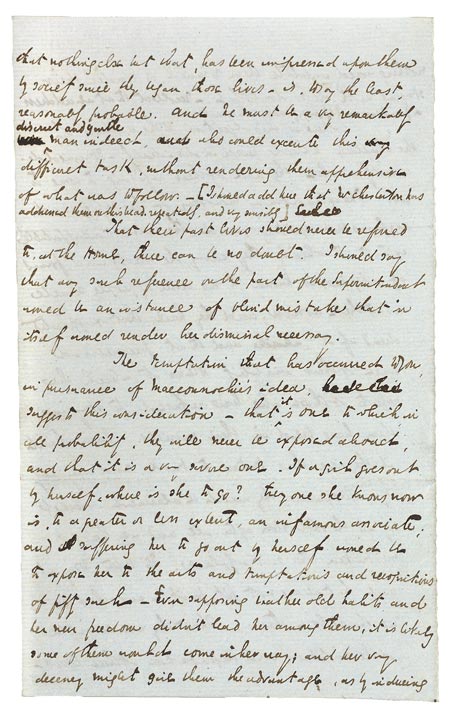
Dickens's letters to Burdett-Coutts are, by any standard, extremely long and detailed and reveal his extraordinarily competent administrative abilities as well as shrewd insight into the minds and motivations of the women who would enter Urania Cottage. He insisted "that their past lives should never be referred to." He also recognized "that these unfortunate creatures are to be tempted to virtue. They cannot be dragged, driven, or frightened." Dickens's meticulous attention to detail is apparent in this letter, in which he informs Burdett-Coutts that "I have laid in all the dresses and linen of every sort for the whole house... I have made them as cheerful in appearance as they reasonably could be—at the same time very neat and modest."
Philanthropy
From 1840 Dickens guided the charitable work of philanthropist Angela Burdett-Coutts (1814–1906), the wealthiest heiress in Victorian Britain. Dickens served as her official almoner and helped to assess the merits of the thousands of letters she received from those seeking financial assistance. He also advised on her plan for improved sanitation in the slums of Westminster and drew her attention and support to the Ragged School Union, which provided education to London's poorest children. A pragmatist, Dickens encouraged Burdett-Coutts to direct her philanthropy toward the causes of distress. In 1847 they founded a home, Urania Cottage, in Shepherd's Bush, as a shelter for homeless women—prostitutes or petty criminals who sought to rehabilitate themselves by learning practical skills and developing self-discipline. Many of the women were assisted to eventually emigrate to one of Britain's colonies to begin a new life. For more than ten years, Dickens administered Urania Cottage on behalf of Burdett-Coutts and played an extremely active role in its day-to-day management.
that nothing else but that, has been impressed upon them by society since they began those lives—is, to say the least, reasonably probable. And he must be a very remarkably discreet and gentle man indeed, who could execute this very difficult task, without rendering them apprehensive of what was to follow.—[I should add here that Mr. Chesterton has addressed them on this head, repeatedly, and very sensibly.]
That their past lives should never be referred to, at the Home, there can be no doubt. I should say that any such reference on the part of the Superintendent would be an instance of blind mistake that in itself would render her dismissal necessary.
The temptation that has occurred to you, in pursuance of Macconnochie's idea, suggests this consideration—that it is one to which in all probability, they will never be exposed abroad, and that it is a very severe one. If a girl goes out by herself, where is she to go? Every one she knows now is, to a greater or less extent, an infamous associate; and suffering her to go out by herself would be to expose her to the arts and temptations and recognitions of fifty such—Even supposing that her old habits and her new freedom didn't lead her among them, it is likely some of them would come in her way; and her very decency might give them the advantage, as by inducing
